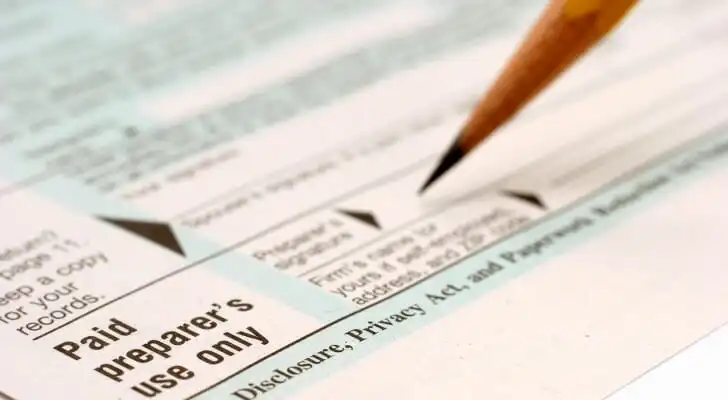 Tax professionals designated as accredited tax preparers (ATP) can help ensure an individual’s returns are up to the standards of the IRS. By passing an exam, the national ATP credential demonstrates a thorough understanding of the current tax code and the preparation of individual tax returns. You can use SmartAsset’s free tool to find a financial advisor who may be able to help with both filing your taxes and making an overall tax plan.
Tax professionals designated as accredited tax preparers (ATP) can help ensure an individual’s returns are up to the standards of the IRS. By passing an exam, the national ATP credential demonstrates a thorough understanding of the current tax code and the preparation of individual tax returns. You can use SmartAsset’s free tool to find a financial advisor who may be able to help with both filing your taxes and making an overall tax plan.
The Accredited Tax Preparer Credential, Defined
The accredited tax preparer certification is offered by the Accreditation Council for Accountancy and Taxation (ACAT), a nonprofit testing, accrediting and monitoring organization. While there are no education or work experience requirements, those seeking the credential must pass an in-person exam, which is offered twice at year at testing centers in all 50 states.
The exam itself costs $250. There is also a separate $50 credential activation fee and a $20 certificate fee. Preparing for the exam can cost money too. For $150 (or $100 for members of the National Society of Accountants), registrants can access an online ATP prep course.
The course extensively covers topics relating to 1040 issues including supporting schedules, self-employed returns and ethics. It also comes with an online practice exam, which generates randomized questions to help users prepare. The ATP practice exam can also be purchased separately.
To keep their credential current, ATPs must complete 24 hours a year of continuing education or 72 hours of continuing education in a three-year period. The annual renewal fee for a single ACAT credential, including the ATP designation, is $99.
Benefits of the ATP Designation
For tax professionals, having an accredited tax preparer credential attached to your name will set you apart in the marketplace. For clients, choosing an ATP is a strong signal that the person they’re working with has advanced expertise.
In addition, because they’ve already passed the ACAT exam, ATPs don’t have to take additional classes to earn a Record of Completion for the IRS’s Annual Filing Season Program (AFSP) — an initiative designed to encourage non-credentialed tax-return preparers to participate in continuing education courses.
IRS Representation Rights for an ATP
 While any tax professional with a preparer tax identification number (PTIN) can legally prepare federal tax returns, not all can represent clients before the IRS. And even among those who can, only a select group possesses unlimited representation rights. Here are the three different groups of rights.
While any tax professional with a preparer tax identification number (PTIN) can legally prepare federal tax returns, not all can represent clients before the IRS. And even among those who can, only a select group possesses unlimited representation rights. Here are the three different groups of rights.
- Unlimited representation rights: Among this group are certified public accountants, attorneys and enrolled agents. (An enrolled agent is a status awarded by the IRS to people who pass a comprehensive three-part exam or have prior experience as an IRS employee.) These professionals have no restrictions as to whom they can represent, what tax issues they can handle, or which IRS office they can appear before. For example, they can even represent clients whose returns they did not prepare.
- Limited representation rights: Tax preparers with limited representation rights can only represent clients whose returns they have prepared and signed, and do so only before customer service representatives, revenue agents and similar IRS employees. Tax-return preparers with limited representation rights cannot represent clients regarding appeals or collection issues even if they prepared and signed their tax returns. Participants in the IRS’s Annual Filing Season Program — including accredited tax preparers, who automatically qualify — have limited representation rights.
- No representation rights: Finally, there are PTIN holders, who have an active preparer tax identification number but no professional credentials and do not participate in the Annual Filing Season Program. As of 2016, PTIN holders are only authorized to prepare tax returns; they cannot represent clients before the IRS for any reason.
The Bottom Line
 Most tax preparers aren’t accountants and may only hold an associate’s degree. But if you see the “ATP” designation after someone’s name, that means they’ve dedicated time (and money) to furthering their understanding of the tax code. To earn their credential, ATPs must pass a 100-question, multiple-choice exam that evaluates their proficiency in preparing individual tax returns, knowledge of Form 1040 issues and ethics.
Most tax preparers aren’t accountants and may only hold an associate’s degree. But if you see the “ATP” designation after someone’s name, that means they’ve dedicated time (and money) to furthering their understanding of the tax code. To earn their credential, ATPs must pass a 100-question, multiple-choice exam that evaluates their proficiency in preparing individual tax returns, knowledge of Form 1040 issues and ethics.
Tax Filing Tips
- Filing your taxes on time is important but so is your overall tax strategy. A financial advisor can help you make a tax plan and execute it in order to lower your tax liability. Finding a financial advisor who meets your needs and goals doesn’t have to be hard. SmartAsset’s free tool matches you with up to three vetted financial advisors who serve your area, and you can interview your advisor matches at no cost to decide which one is right for you. If you’re ready to find an advisor who can help you achieve your financial goals, get started now.
- To make sure your tax return is complete and up to IRS standards, consider hiring an accredited tax preparer. An ATP might also be able to find you more deductions or exemptions that you wouldn’t have known about on your own.
- If you do decide to hire an accredited tax preparer, make sure they know about any major life events, like an inheritance or a divorce, that may affect your tax situation.
- You might also want to consult with a financial advisor to help you plan for more than just your annual tax return, including issues concerning retirement and estate planning.
Photo credit: ©iStock.com/Trawick-Images, ©iStock.com/Drazen Zigic, ©iStock.com/courtneyk